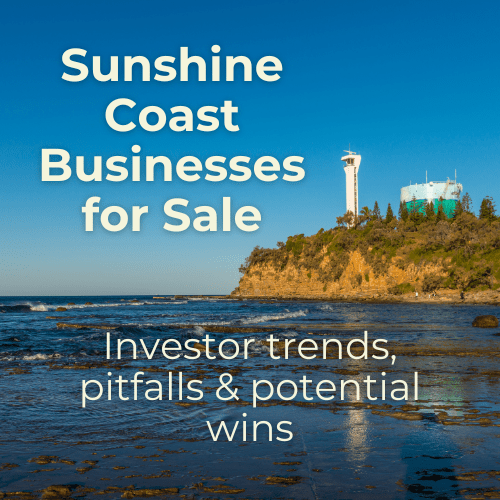
Business for Sale Sunshine Coast: Investor Trends, Pitfalls and Potential Wins
Share
Why Investors Are Flocking to the Sunshine Coast
The Sunshine Coast has quietly transformed from a relaxed seaside escape into one of Australia’s most attractive regional investment zones. Driven by infrastructure upgrades, population growth, and a booming entrepreneurial spirit, business buyers are increasingly targeting this region for long-term returns and lifestyle synergy.
In this guide, I unpack everything you need to know before you buy: investor trends, common pitfalls, valuation methods, due diligence tips, trusted local brokers, case studies from real deals, and key post-acquisition strategies.
Business Valuation in Coastal Markets: Sunshine Coast Style
Valuing a business in a lifestyle-driven region like the Sunshine Coast isn’t always as straightforward as applying a multiple to EBITDA. While traditional models still apply, local nuances matter. For example, hospitality and tourism ventures might appear profitable over peak seasons but struggle in off months. Retail businesses may be heavily reliant on foot traffic driven by local events or holidaymakers.
Here are the main valuation methods used:
- EBITDA Multiple: Most profitable service and B2B businesses sell for 2–4x EBITDA depending on size, systems, and sustainability.
- Asset-Based Valuation: Used in capital-intensive businesses (transport, trades, manufacturing). Tangible assets form the core value.
- Revenue Multiple: Common for digital or growth-stage businesses with low overhead and potential, ranging from 0.5–1.5x annual revenue.
Be sure to normalise the financials, subtract discretionary expenses, and understand the role of the owner in daily operations. Owner-dependence can severely impact both valuation and transition success.
How Smart Investors Finance Sunshine Coast Business Acquisitions
Unless you’re buying with cash, you’ll need to secure or structure a deal creatively. Here's how most buyers fund their Sunshine Coast business purchases:
- Bank Finance: Banks are cautious post-COVID. You'll need 20–30% upfront, strong historicals from the business, and possibly personal guarantees.
- Vendor Finance: Many sellers are open to 6–24 month payment terms for a portion of the sale price — especially if it helps bridge valuation gaps.
- Earn-Out Agreements: Part of the sale is contingent on future performance. This is common when revenue is volatile or owner handover is critical.
- Private Capital: High-net-worth individuals, family offices, or silent partners are increasingly looking at coastal business investments as lifestyle-aligned diversification.
Combining two or more of these often makes deals easier to close and keeps risk balanced across both parties.
Due Diligence: What to Really Look For
Don't let surface-level financials fool you. True diligence requires digging into what’s underneath the P&L:
- Revenue Quality: How much is recurring, contract-based, or reliant on one-off project work?
- Customer Concentration: Do 1–2 clients make up more than 30% of revenue?
- Systemisation: Are there documented SOPs, onboarding processes, or key-person risk?
- Lease Terms: Can you stay long term? Are there escalations or constraints?
- Employee Risk: Who’s critical? Are staff casual, contracted, or salaried?
Use my Due Diligence Checklist to avoid common traps.
3 Sunshine Coast Business Acquisition Stories
Case 1: Digital Nomad Buys a Cleaning Franchise
Mel, a former remote project manager, bought a domestic cleaning franchise with $300k in revenue. She systemised client comms, outsourced bookings, and doubled recurring clients in 18 months — all while travelling Australia. Her takeaway? “Buy a business with hidden operational slack.”
Case 2: Tradie Transitions to Multi-Service Maintenance
A local plumber acquired a one-man gardening round and added handyman, fencing, and irrigation services. He built a multi-service home maintenance team and grew from $90k to $650k turnover in two years. Key move: bundling complementary services under one brand.
Case 3: Café Owner Regrets the Buy
A couple from Brisbane bought a Noosa café thinking it would be a lifestyle upgrade. Staff churn, council red tape, and tourism dependency meant burnout and a resale within 12 months. Lessons? Don’t confuse lifestyle with ease, and don’t skip due diligence on lease clauses and award compliance.
Top Sunshine Coast Business Brokers
- LINK Business Brokers – Australia-wide reach with strong Sunshine Coast coverage.
- Verified Businesses – Locally owned with excellent market knowledge and transparent listings.
- Savvy Business Sales – Over 30 years of Queensland brokerage experience, especially in lifestyle and services.
- Bizbrokers Business Sales – Focused on small business and hospitality deals.
- The Finn Group – National brokerage with franchise resale expertise.
- TD Mango – Boutique, high-touch service with deep regional knowledge.
- Bonza Business & Franchise Sales – Fixed-price, online-first business sales model with national visibility.
Post-Acquisition: 90 Days to Stability
Here’s how I coach new buyers to stabilise and scale post-acquisition:
- Keep the Seller Close: A structured 30–60 day handover reduces risk dramatically.
- System Review: Immediately map workflows, identify bottlenecks, and record SOPs.
- Customer Contact: Introduce yourself early. Let clients know you care and you’re here to improve.
- Set New Baselines: Measure performance weekly, then optimise.
Conclusion: Play the Long Game
The Sunshine Coast offers serious opportunities for investors who do the work — not just those chasing a beachside dream. From growing trades and tech to service-based assets and professional practices, there’s a business for every type of buyer.
If you’re serious about investing in the region, don't do it blind. Use the resources here, engage with trusted professionals, and make sure your next deal is built on substance, not emotion.
Take the Next Step
- Investor Hub – Explore live deals, free resources, and frameworks to make smarter decisions.
- Book a Strategy Call – Let’s review your criteria, discuss a deal, or map your acquisition journey.
- Download the Due Diligence Checklist – The exact tool I use with my coaching clients to vet deals.
Related Reads
- Sunshine Coast Business Coaching: Why Local Matters in a Global World
- Don’t Buy a Business Without This: The Investor’s Business for Sale Checklist
- How to Buy a Business for Sale in Australia: The Ultimate Investor's Guide
- Business for Sale Gold Coast QLD: Why Investors Are Flocking to This Region
- How to Evaluate a Business for Sale Like a Pro Investor (Before You Buy)
